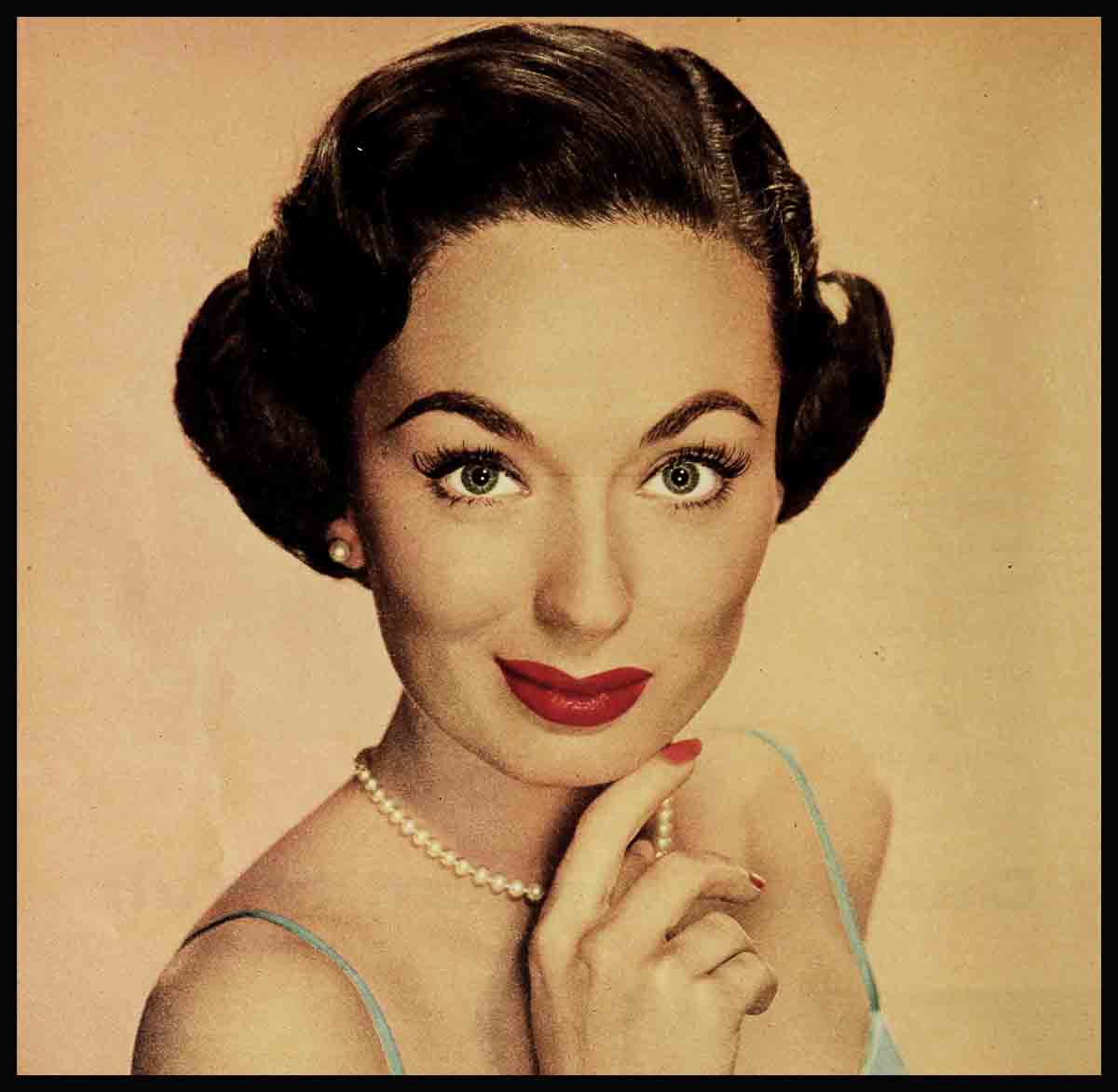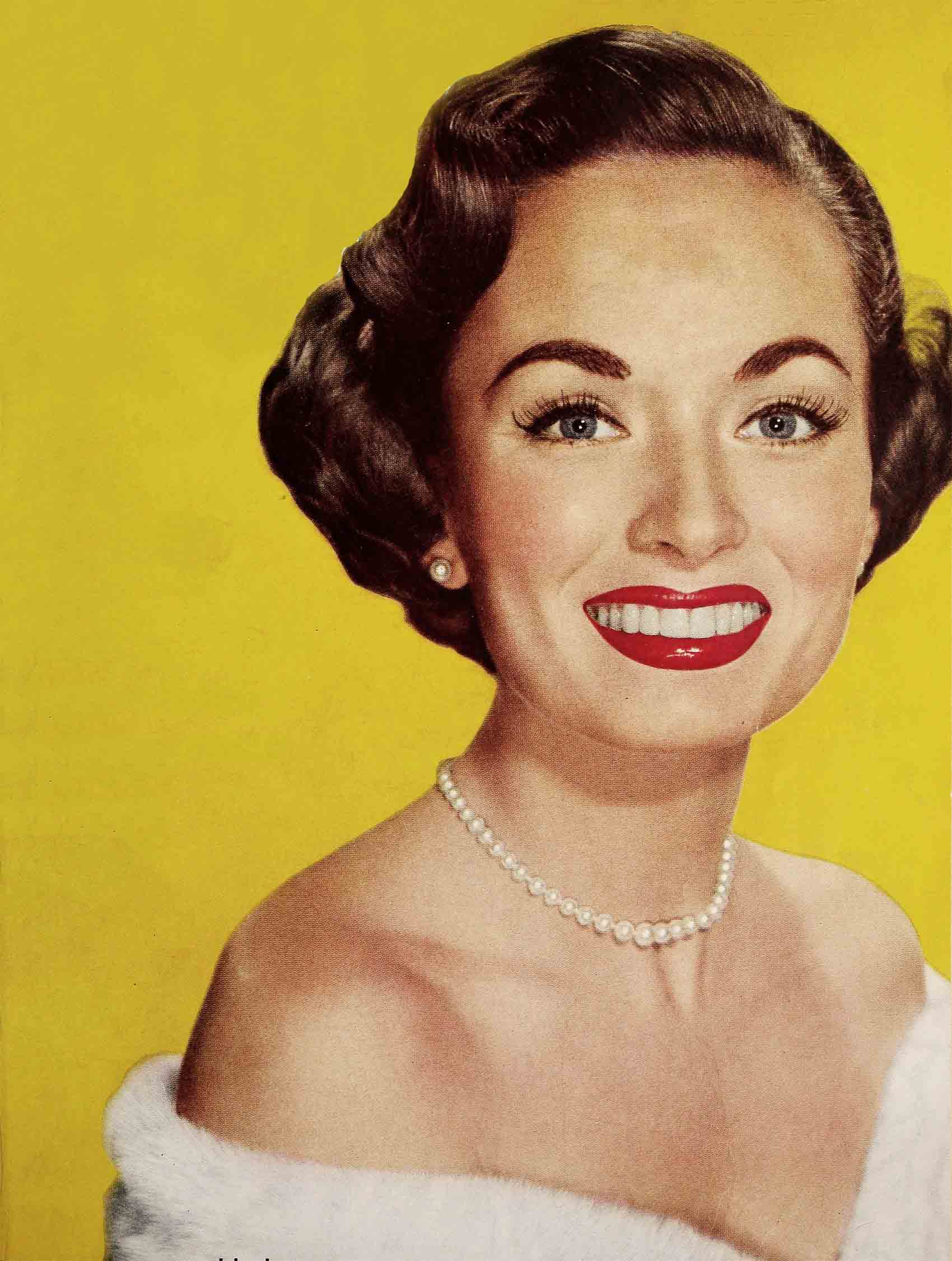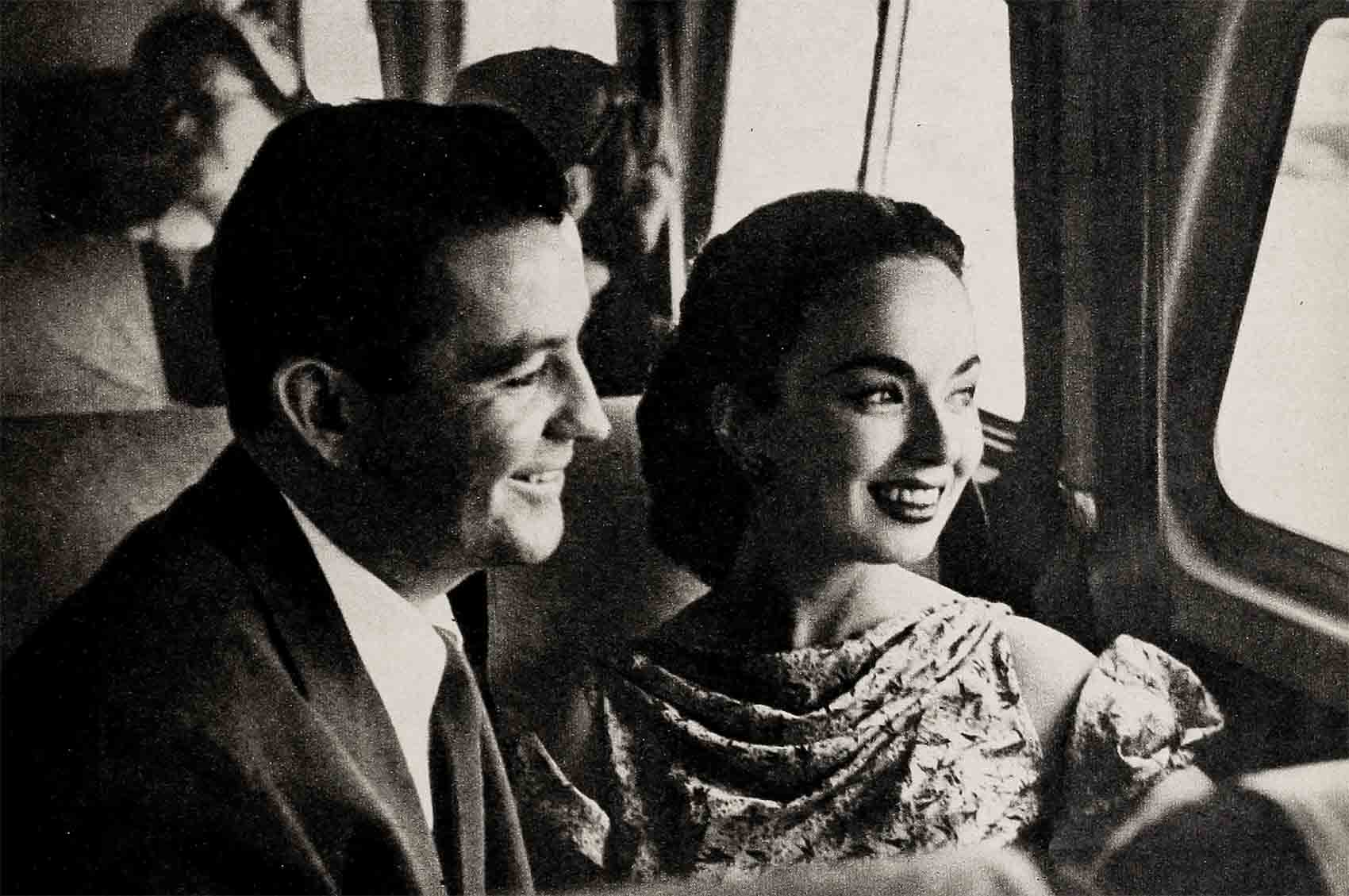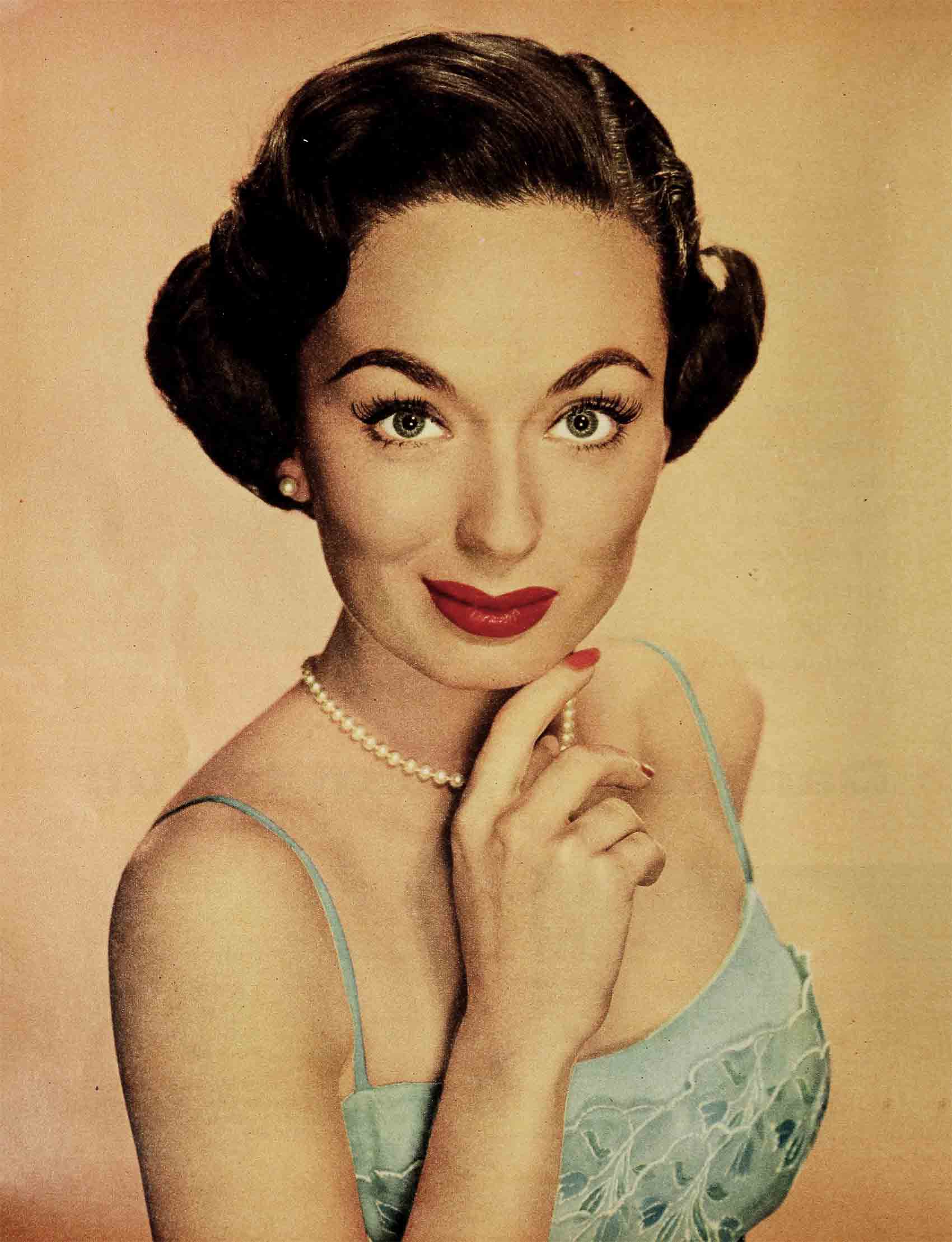
Irish Lullaby—Ann Blyth
Ann Blyth McNulty was exactly two weeks and three days away from giving birth to her first child, it later turned out, when she arrived in my garden (newly landscaped at no small expense, I might add) carrying in her arms an unusually large assortment of bundles.
In a casual but curious glance I spotted a fat TV script, a notepad, three bags filled with materials, plus what appeared to be some samples of wallpaper.
“What in the world have you got here?” I gasped, helping her to put down her armload, even before I said hello. There was a time, I could remember, when mothers-to-be were very careful about carrying heavy things.
Ann laughed as she slipped—nudged herself, rather—into one of my new garden chairs and sat down. “Whew! It’s getting warm. May we sit here?” When I said they most certainly could, Ann explained her bundles.
“Oh, this is a television script, Louella. You know I’ve been doing tv right up to ten days ago when I started to show. This is the script I’m going to do a few weeks after the baby is born.
“Those other bundles are samples. I’m not taking any chances on having the wrong welcome for either a boy or a girl. The nursery so far has blue furniture, blue rug, blue wallpaper and a pink sofa—but I think I’ll add a few yellow touches. My close friend, Jeanne Crain, tells me yellow has become very chic for nurseries. Jim and I want our baby to have the latest fashion gasp.
“That sample over there,” she pointed to one of the bags piled on the table, “has a combination of pink, blue and yellow in a lovely organdy. And that bundle holds some plain diapers. You know, all the gifts I got at showers were so fancy—diapers, if you please, with rosebuds!”
Ann threw back her lovely head and laughed with a heartiness completely new in this girl who has always been so restrained and demure even when amused.
There are so many new things about Ann these days, perhaps the most noticeable being the new maturity of her beauty. Despite her pregnancy, her face is thinner, revealing the lovely bone structure.
In her soft, pale pink maternity dress with an embroidered collar and a petticoat trimmed with rhinestones she looked like a lovely modern Madonna—until she spoke. Then her down-to-earth humor, particularly about her “interesting condition,” was very much that of this world.
“For a little while,” Ann smiled, “I thought I was going to be sort of a wonder of nature, not showing my condition until the baby arrived. Until a few weeks ago I don’t think you could tell I was going to have a baby, do you?”

I certainly didn’t—and said so. At the Academy Awards, singing the Oscar-winning song, she looked so slender that many people criticized Donald O’Connor for remarking that the number had been sung by “Ann Blyth and family.”
As I told you in Good News last month, the person least upset about Don’s description was Ann herself! “Such a fuss about nothing,” she said at the time, “since when is having a baby in bad taste? Or even mentioning the fact?”
I said, “Ann, I can’t remember any girl expecting a baby who has been as busy professionally and socially as you have been while you were enciente, to put it Frenchily. Many about-to-be-mothers for the first time make a point of taking it easy.”
“Why shouldn’t I keep busy?” she asked, sipping her tea, “I’ve felt much too well to be idle.
“Besides, I’ve had such a wonderful sense of security—especially with Jim’s being the fine obstetrician he is. Jim is the one who has encouraged me to keep busy as long as I felt well. Do you know,” she added, her eyes wide, “I didn’t even have morning sickness!
“Once in a while I’ve felt like being lazy,” she laughingly admitted, “but my Jim kids me out of it. If I just sit for hours, doing nothing he’ll say, ‘Ann, do you want to have to take off a lot of weight after the baby comes?’ That sets me to jumping, you can bet.
“I believe that one of the best things that happened to me was that Jim put all kinds of books on childbearing and the care of infants into my hands.”
Ann went on, “I wasn’t exposed to a lot of gossip about terrible pain or any of the old wives’ tales about prenatal influence. Jim particularly insisted that I wasn’t to think of myself as an invalid.”
“Well, you certainly took him at his word,” I laughed.
I knew, for instance, that while pregnant Ann had started and finished her picture, Rose Marie; that she had appeared on countless TV shows; that she had been rehearsing her nightclub act which she will open in Las Vegas later in the season, and She had been flying!
“Oh, yes,” she affirmed, “we’ve flown to San Francisco and to Las Vegas. It was so much fun going to Las Vegas with Jim and my aunt and uncle and Mr. and Mrs. Newt Bass, from Apple Valley. We also spent a vacation there.

“You know, I think I’m going to like my nightclub experience in Las Vegas. I want to take the baby with me. I couldn’t bear to leave him—or her—for a minute.”
“Ann,” I laughed, “you’re going to be singing Irish lullabies in a streamlined fashion. Imagine finishing a song number in one of those gilded gambling palaces and then dashing backstage to give the baby its bottle.”
“The baby won’t be backstage. It will have the best and quietest suite in the place,” she assured me.
“Do you think Jim will mind your taking the baby to Las Vegas,” I asked, “or haven’t you had your first argument yet with that good-looking Irishman?”
She said seriously, “No, we have never had an argument—and I hope we never have our first one. I just can’t believe that every marriage has to have its ups and downs, even minor battles during which little cruel things are said. I just don’t believe this is necessary where two people share love and respect equally.
“If Jim and I are thinking a little differently about even the smallest thing, we talk it out. It doesn’t take me long to see his side and it doesn’t take him long to see mine. Insisting on having one’s own way all the time is sheer stubbornness.”
“Ann,” I said, “you are such a sensible little girl and, to me, you are still very much a little girl. Just a few years ago you were having chaperoned dates.”
Ann said with dignity, “But the important thing is that inside my mind and heart I’m no longer a little girl, Louella. I’m a woman experiencing the most miraculous things that can happen to a woman—marriage and motherhood.
“There is not a night that goes by that I do not thank God for my womanhood. Right now I can think of nothing except my baby who will soon be here.
“I have such wonderful thoughts for him—or her. If it’s a boy his name will be Timothy Patrick McNulty. Nothing would make me prouder than for him to follow in Jim’s footsteps in the medical profession. But if he wants to be a trapeze artist—well, his ma will be ringside rooting for him.
“The same thing goes for Maureen Alanna—that’s the name we’ve selected for a daughter. We found that name in an Irish book with 3000 names. If Maureen Alanna is interested in acting or singing—her parents will be happy.”
I laughed, “Suppose Timothy wants to be a singer and Maureen wants to be a doctor?” I suggested. “That’s the way the best laid plans of parents usually work out, Ann.”
“Believe me, that’s all right, too” smiled Mrs. McNulty. “All I hope is that I shall have many, many children,” Ann hesitated a moment before she continued, “so I can just mother them.”
I knew she was thinking of her own mother, the wonderfully kind and understanding woman who died in 1946 when Ann was in her early teens and needed her most. Her grief verged on desperation.
As though she had picked up my thought, Ann said softly, “After the first shock of losing my mother, my deepest emotion was bitterness. I thought, ‘Why should this happen to me? Why, why?’
“But luckily, I had my Aunt Cissy and Uncle Pat (Tobin), those beloved people with whom I came to live. They said to me: ‘Ann, we can go just so far with you in your grief. You must find your own way. Your mother isn’t lost to you if you seek her through prayer and faith and the knowledge that she is still with you forever and forever. But you cannot find her if you are bitter and nurse a sense of betrayal.’

“I know now how right they were, Louella,” Ann said. “But how wonderful it is going to be to put my arms around my babies and hold them close and warm to—their mother! We’re getting awfully serious, aren’t we?”
In a lighter tone, she continued, “I don’t think there’s much doubt but that Jim and I will have a large family if heredity helps. Jim’s parents have five sons, a daughter and twenty grandchildren.”
We both laughed again—good laughter. It’s very easy for Ann to laugh these days. Seemingly, she has everything in the world to make a woman happy—a fine and respected career, a family started and the devotion of her wonderful Dr. Jim.
Although Ann had been a contented girl ever since she found her way after losing her mother, I think her supreme consciousness of happiness came when she met Dr. McNulty.
“How did he happen to date you the first time?” I asked Ann.
She smiled, “He did it very reluctantly. His brother, Dennis Day, asked Jim if he’d like-to go to dinner with his wife and himself and he said I’d be along.
“Jim said, ‘You mean Ann Blyth, the movie actress?’ Dennis replied, ‘That’s the one.’ Later, Dennis told me that Jim had said ‘No, thanks’—but for some odd reason he came along.”
I asked, “What first attracted you to Jim?”
“Well, first,” Ann laughed, “I liked his looks. He looks so Irish with his dark hair and blue eyes and I have a weakness for the Irish.
“But almost immediately I was conscious of his kindness. I thought when I first met him, and I still think, that he’s one of the kindest men I’ve ever known.
“It’s a quality that does not always go with a young man—but I think my Jim was born with it. Dennis says so. Dennis and Jim are brothers next-to-each-other. They always have been very close.”
“Was it love at first sight?” I prodded.
“All I can say to that is that I hoped he would call me again and again—and again. And he did!
“We went together for six months and I think we both realized we were growing closer and closer. One evening Jim said, ‘Ann, you and I are beginning to look a little alike.’ And it was true.
“But still, he didn’t get around to popping the question,” Ann laughed. “I was beginning to wonder. Later, Dennis told me Jim had bought a ring and had been carrying it around for weeks without getting up enough nerve to ask me.
“One night he came to pick me up—I think we were going to an industry dinner—and he sort of grabbed at his pocket, fished out the ring and said, ‘Here, Ann. Do you want this?’
“Do you know what I did? It was such a surprise and I was so happy, I got sick to my stomach! My aunt made me go and lie down a little while. Isn’t that a fine and romantic way to accept a proposal?”
Before I could answer, Ann was chatting on happily, “The funny part is that Jim told me he felt a little like fainting himself! That is the first and last time we’ve made each other sick!”
The afternoon shadows were lengthening over the garden when Ann arose and said she had marketing to do yet.
“No, no,” I cried, “not more bundles to carry?”
“And dinner yet to cook,” she chuckled, “Believe it or not, I’m becoming a very good cook, balanced meals, right number of vitamins and that sort of thing. I really have to keep on my toes because Jim is a very fine cook. I think that when men are good cooks they’re much better than women, don’t you?”
Never having been lucky enough to have been close to a man who was tops in the culinary department I couldn’t speak with authority on this subject. But I did congratulate Ann on her good luck.
On second thought as I watched her leave, her newly awkward figure burdened down with samples and materials and scripts, I questioned whether the happiness Ann has found can be attributed to luck.
In the case of this really fine and religious girl, isn’t Ann’s luck more a manifestation of the lovely things she so richly deserves—a reflection of the kindness and goodness she herself brings to her career, to her home and to her friends?
THE END
—BY LOUELLA PARSONS
It is a quote. MODERN SCREEN MAGAZINE AUGUST 1954




